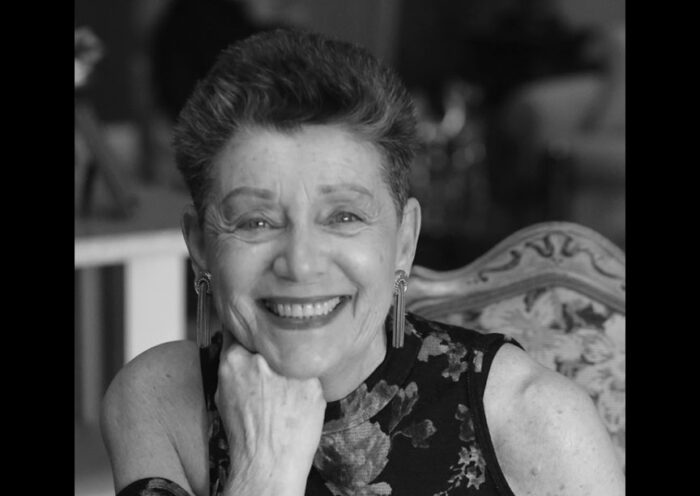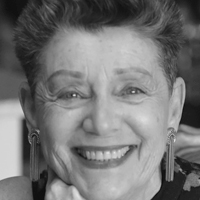Some Peace
by Rita Plush
Two old ladies now, I met my brother’s future wife in the ’50s—let’s rock and roll!
And we did; within a year we both were married. Other life events jibed as well: becoming pregnant with our firsts, buying our homes, hers far more lavish in size and zip code than mine (my brother was a rousing success early on).
Though I did want nice things, I couldn’t see myself in her house, or the country club they’d joined—the lifestyle too la-de-da for my more earthbound tastes. Was I jealous? I didn’t want what she had, but I didn’t want her to have them either? Trying now to get a pulse on what I felt back then is taking some doing. But I’m working on it.
She had a standing Friday at a salon for a wash, set and blowout, mid-week for a recomb. Except for a cut every six weeks, I washed and rolled up my hair, slipped on my Lady Sunbeam bonnet (hose attached), hitched the portable motor around my waist, and vacuumed while my hair dried. With three children under five years, my main interest was getting out of my nightgown before my husband got home from work.
Her hobby was shopping; she had a stylish eye. I learned from her to be more selective in my choices and upped my wardrobe. I asked her once where she bought a certain dress, scurried over, and snapped it up in a different color. The sour look she gave my new frock said she was not flattered.
Years later, my children grown, I started an interior design business. After that, I decided I wanted a college education and got undergraduate and graduate degrees in English. She had a brief stint selling real estate, also enrolled in college but dropped out because my brother wanted to travel. Our goals and aspirations were very different. Instead of creating a yin/yang, a complementary balance between our personalities—me, outspoken and opinionated, she, thin-skinned, easily took offense—our different makeups widened our gap. To be blunt: we rubbed each other the wrong way.
If matters were tenuous between us, the shit hit the proverbial fan when my mother died.
Writing in earnest then, eager to capture the family dynamic, I put to paper my impressions of her shiva, the Jewish seven-day mourning period. I fictionalized my brother as a landscaper and his wife as an Israeli who couldn’t cook, when she was actually a pretty good cook. The piece was published. The description offended her. My family sensed the slap; our strained relations, a secret no longer.
Defending myself to myself, and to others: That’s what writers do; we make up things! But did I have to make up that thing? Was it the writer in me cracking wise, or was I taking a swipe at her? She swiped me but good. Dropped me like an e before ing. I was relation non grata for years.
During that time, I would meet my brother occasionally for lunch. I need to say here that we were not ever close.
Growing up I had never felt his big-brotherness, that under-his-wing mentoring often felt by younger siblings. The most we had in common was to eye-witness my father’s hot, unpredictable temper, most often aimed at him. Belittled and criticized at every turn—You’ll never amount to anything! shrieked my father—it’s amazing he turned out so well. I hurt for my brother then, but don’t think I ever told him. Would that have made us closer if I had?
At those infrequent lunches we did find things to talk about: our children, upcoming vacations—surface talk, information talk. The few times I brought up our father—real talk—I noticed he was overcome by an urge to visit the men’s room. I sensed his distress and went back to safer ground. At least we had contact; I was grateful for that.
Eventually, his wife thawed and, as with warring nations, we arrived at a detente. Still, keeping conversations between us light and agreeable was an effort; so much of her talk annoyed me that if I managed to keep my mouth shut—shooting from the lip was my default—I gave myself an A+ in self-control.
By then, I had more pressing things on my mind—a son stricken with ALS;a daughter with advanced breast cancer—than chasing someone who, at best, wanted nothing to do with me. Week by week, their conditions worsened. The realization that I would likely survive them was unbearable. I needed support, the listening ears and open hearts of those I loved. I needed my brother.
He would be there for me, he said. I could count on him, he said. “Anything, sis.”
Anything turned out to be a once-in-a-blue-moon call asking how my children were. For the most part, I took the initiative. I told myself, let it go. It’s not in him. He can’t do more. Accept it!
A stroke took my brother a few years ago.
At his grave, the rabbi told of his many contributions to yeshivas and other Jewish causes. My brother was a generous man, devoted to his faith. But what struck me were the beautiful tributes from his children and grandchildren. You could hear it in what they said—they had pet names for him—feel the emotion with which they spoke, how they clung to each other in their grief. Adored is the word I came away with. And he must have adored them, and cared and given fully to them. Apparently, he did “have it in him.” Perhaps when he packed up and left home—and our father’s constant put-downs—he made a clean break, and somehow broke with me as well.
Last year my daughter died of breast cancer. His wife came to the funeral, the shiva, but after that… months passed. How much time does it take to shoot a text or send an email—Thinking of you. How’re you doing? — if you can’t drag yourself to the phone for a proper call? And because I so much wanted her to reach out to me, I, like a schmo, texted her.
Ever hear the joke about the lady and the gorilla?
She’s on a trip to Africa and she gets lost in the jungle. No food, no shelter. A gorilla finds her and takes her into his lair. Ravages her for weeks on end. Finally, she’s rescued. Home, she tells her friends all about her ordeal.
“What about the gorilla?” they say.
“He doesn’t call … he doesn’t write…”
That’s her! Not a word, not a peep since my text a year ago and counting. Her husband’s gone; she wants me gone. So … why did I pursue her? Why am I still expecting/hoping for her call? Why, when I’m looking to keep stress and aggravation out of my life, do I want this woman back in? Maybe, I’m thinking now, it’s not her I want or ever wanted. Maybe it’s my brother I’m still looking for. My distant elusive brother. To be close to his presence, through her. The way I feel close to my son and my daughter now—their energy, the essence of who they were—when I’m with their spouses. As of a precious metal over a duller alloy, they give my life a little shine; a luster, otherwise lacking.
I will get no gold from her, but I’ll do without. I’ll believe that my brother did care for me; he just wasn’t able to show it. When I think of it that way, it gives me some peace.
BIO
Author of the novels Lily Steps Out and Feminine Products, and the short story collection Alterations, Rita Plush is the book reviewer for Fire Island News and teaches memoir at Queensborough Community College. Her stories and essays have been published in The Alaska Quarterly Review, MacGuffin, The Iconoclast, Art Times, The Sun, The Jewish Writing Project, The Jewish Literary Journal, Kveller, Jewish Week, Newtown Literary Review, Down in the Dirt, and Down in the Dirt Collected Stories, 2021, Potato Soup and The Best of Potato Soup, 2021. Flash Fiction Magazine, Broadkill Review, Backchannels, Persimmon Tree, LochRaven, Avalon Literary Review, Chicken Soup For The Soul, Sanctuary Magazine, Write City Magazine, Hadassah Magazine and Delmarva Review.



















